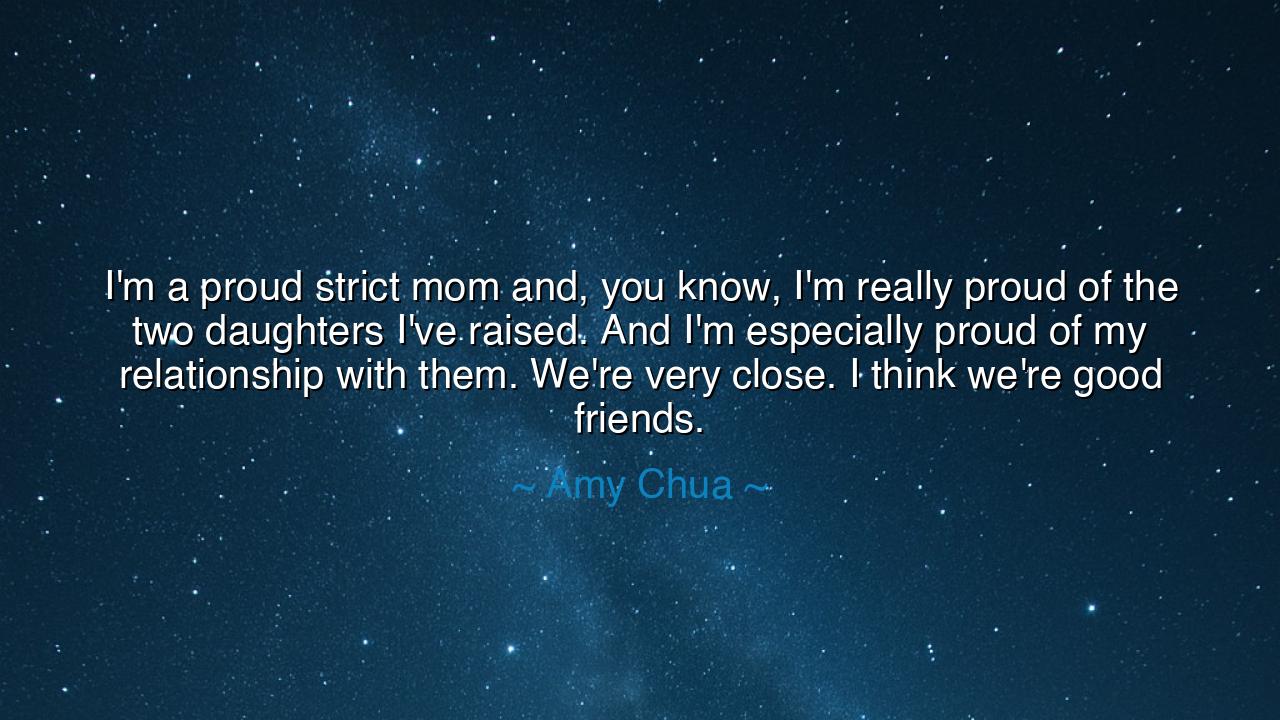
I'm a proud strict mom and, you know, I'm really proud of the two
I'm a proud strict mom and, you know, I'm really proud of the two daughters I've raised. And I'm especially proud of my relationship with them. We're very close. I think we're good friends.






Amy Chua, known to many as the “Tiger Mom,” once declared: “I’m a proud strict mom and, you know, I’m really proud of the two daughters I’ve raised. And I’m especially proud of my relationship with them. We’re very close. I think we’re good friends.” These words carry not only the pride of a mother but also the wisdom of one who has walked the long and often difficult road of raising children. In her statement lies the paradox of discipline and affection, of authority and intimacy, which together form the bedrock of a strong family bond.
At the heart of her saying is the idea of being a strict mom. Strictness is often misunderstood in the modern world, seen only as harshness or rigidity. But in its nobler sense, it is love clothed in discipline. It is the refusal to let children drift aimlessly, the insistence on high standards, the belief that within them lies greatness that must be drawn out through effort and guidance. Chua’s pride is not in control for its own sake, but in the fruits of that discipline—the daughters who grew strong, capable, and independent because their mother demanded the best of them.
Yet she does not stop at discipline; she also rejoices in closeness and friendship with her children. Here lies the deeper wisdom: authority without love breeds rebellion, but authority coupled with tenderness creates loyalty and trust. The fact that her daughters grew not distant, but close, shows that the discipline was not despotic but rooted in care. They knew her strictness was born of love, and so when they matured, they did not turn away but drew nearer, becoming not only children but companions.
History offers us mirrors of this truth. Think of Marcus Aurelius, the Roman emperor and Stoic philosopher, who wrote tenderly to his son Commodus, reminding him that discipline must be paired with love. Or consider the story of Susanna Wesley, mother of John and Charles Wesley, who raised a large family with firm discipline and devout teaching, yet was deeply loved by her children, who later founded the Methodist movement. Such examples show that parental discipline, when combined with unwavering affection, can shape not only families but even history itself.
Chua’s pride in her relationship with her daughters also challenges the idea that strictness and warmth are opposites. In truth, the most enduring friendships are not those without boundaries, but those tested by honesty and expectation. By being a mother first and a friend second, she laid a foundation upon which true friendship could later flourish. When children know they are guided firmly in youth, they can grow into adults who freely choose closeness with their parents.
The lesson here is profound: do not fear to be strict if your discipline is rooted in love, and do not fear to be tender if your love has the strength to guide. The task of parenting is not to shield children from hardship, but to prepare them for it; not to indulge every desire, but to shape character through patience, effort, and perseverance. Yet it must always be done with warmth, so that discipline does not wound but strengthens.
Practically, this means setting standards in the home—expecting diligence, kindness, and responsibility—while also cultivating joy, laughter, and companionship. It means saying “no” when needed, but also saying “I love you” without hesitation. It means guiding children firmly when they are young, so that when they are grown, they will not only respect you but choose to walk beside you as friends.
Thus, Amy Chua’s words shine with the wisdom of experience: the balance of being both a strict mom and a beloved one, a guide and a friend, a source of discipline and of joy. It is a reminder that the truest success in parenting is not only in raising capable children, but in raising children who, once grown, still cherish closeness with their parents. And that, indeed, is something to be proud of.






AAdministratorAdministrator
Welcome, honored guests. Please leave a comment, we will respond soon